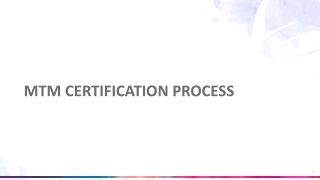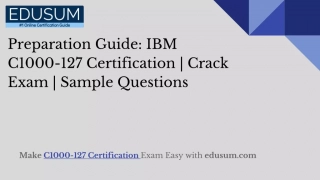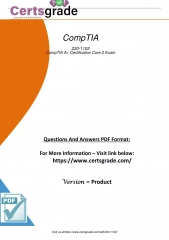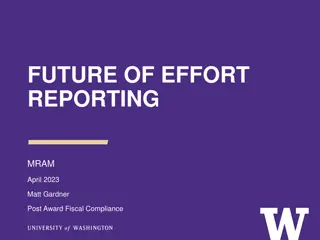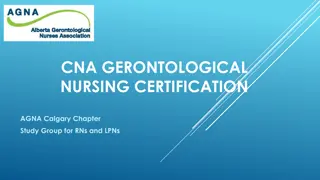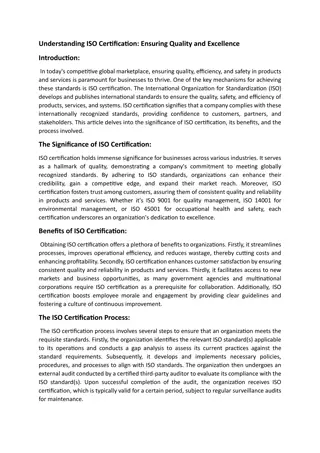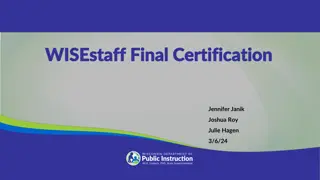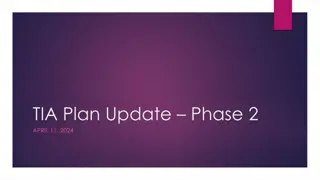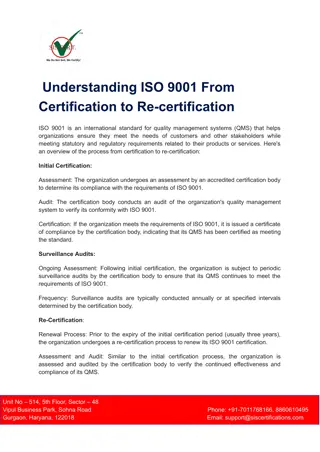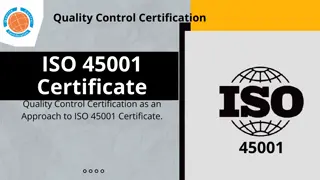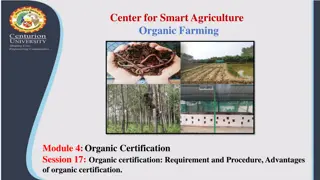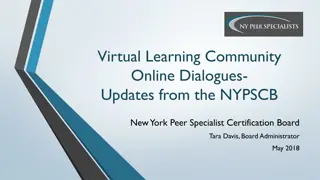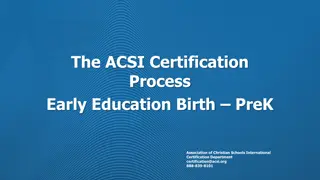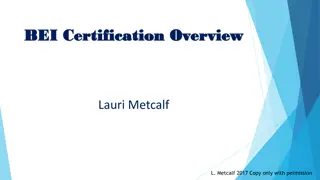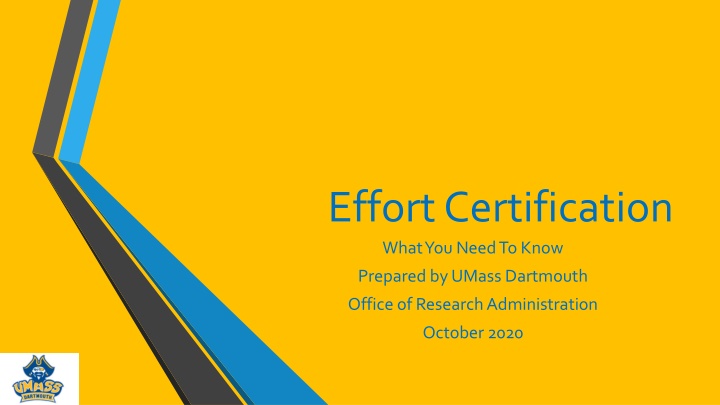
Effort Certification in Research Administration
Effort certification is a crucial process in research administration where Principal Investigators certify the percentage of total effort spent on sponsored projects. Learn how effort is determined, what counts in your 100% effort, and activities not included in UMass Dartmouth effort. Explore the significance of sponsored and non-sponsored activities in effort certification.
Download Presentation

Please find below an Image/Link to download the presentation.
The content on the website is provided AS IS for your information and personal use only. It may not be sold, licensed, or shared on other websites without obtaining consent from the author. If you encounter any issues during the download, it is possible that the publisher has removed the file from their server.
You are allowed to download the files provided on this website for personal or commercial use, subject to the condition that they are used lawfully. All files are the property of their respective owners.
The content on the website is provided AS IS for your information and personal use only. It may not be sold, licensed, or shared on other websites without obtaining consent from the author.
E N D
Presentation Transcript
Effort Certification What You Need To Know Prepared by UMass Dartmouth Office of Research Administration October 2020
Effort Certification Defined Effort certification is the process by which Principal Investigators (PIs) certify that the amount of salary charged and/or cost shared to a sponsored project reasonably represents the percentage of total effort spent on the project during the certification period. Effort certification is not an exact science, nor is it based on a 40-hour workweek. Sponsors recognize that reasonable estimates are all that is expected. An effort card shows the distribution of salary charged to all funding sources during the fiscal period as a percentage of the total annual salary. Any salary expensed to cost share companion accounts appears on the effort card and certified at the same time as sponsored effort. Non-sponsored funds are rolled up and certified in total. Salary is Charged Effort is proposed Effort is certified 3
How is Effort Determined? Effort is NOT based on a 40-hour work week Effort is based on 100% of the activities for which you are compensated by UMass Dartmouth These activities are divided into: Sponsored project activities Non-sponsored activities, such as: Administration, including duties as Chair, Dean, etc. Teaching Research without external funding Public service and outreach Serving on University Committees Attending general departmental faculty meetings 4
What Counts in Your 100% Effort? Sponsored Activity This is your effort on: Federal grants or contracts (e.g. NSF, DOD, NOAA) Non-federal research projects (e.g. a foundation grant or industry sponsored clinical trial) Activities you can allocate to a sponsored project include: Writing progress reports; holding a meeting with lab staff; presenting research results at a scientific conference; reading scientific journals to keep up to date with the latest advances in the project topic area... even if your salary is not completely paid by the sponsor (i.e. salary cost sharing) 5
Activities NOT Included in Your 100% UMass Dartmouth Effort Consulting, lectures, presentations, peer review of manuscripts, scientific review panels, advisory activities, or leadership in professional societies for non-UMass Dartmouth entities regardless of any compensation received for those activities Amounts paid as bonuses or retroactive contractual salary increases paid after the certification period is closed Volunteer public service not directly related to UMass Dartmouth efforts Unpaid absences 6
Examples of Effort Determination If you have a quarter-time job, your 100% effort corresponds to everything you do for that job. So, for you, 0.25 FTE = 100% UMassD Effort If you work 40 hours a week, your 100% effort corresponds to all the activities for which the UMass compensates you during that time. Here, 40 hours = 100% UMASS effort If you work and were paid for one month during the Summer on your project and do not work or are paid to do anything else, your effort for the Summer on your project is 100% 7
Keep In Mind Effort certification should be a reasonable estimate of how time was expended. The Uniform Guidance Subpart E 200.430(c) states, It is recognized that teaching, research, service and administration are often inextricably intermingled in an academic setting. When recording salaries and wages charged to Federal awards for IHEs (Institutions of Higher Education) a precise assessment of factors that contribute to costs is therefore not always feasible, nor is it expected. 8
Institutional Base Salary The total base compensation an individual receives annually from the campus, whether the individual s time is spent on research, teaching, or other activities. IBS includes: compensation for instruction public service research, and/or other activities IBS excludes: fringe benefit payments reimbursed expenses temporary, supplemental compensation for incidental work income earned outside of duties to the institution any portion of compensation deemed to be at-risk. IBS may or may not include additional payment for administrative duties per each campus written policy. EFFORT CERTIFICATION IS BASED ON IBS 9
Why Certify? And consequences if we don t 10
Why Do We Have Effort Certification? Effort reporting is a requirement by the Uniform Guidance for institution receiving sponsored research funding via federal grants and contracts. Uniform Guidance Subpart E 200.430 contains the federal regulatory requirements for internal controls over certifying time expended on sponsored projects. 11
Risk of Non-compliance Severe penalties and funding disallowances could result from inaccurate, False Claims, incomplete, or untimely effort reporting. 12
Who Must Certify? Faculty are required to certify their own effort reports and are required to certify the effort reports of their research staff working on their sponsored project(s) unless they have the employee sign their own. The certification is attesting that effort paid or contributed for a time period matches the effort expended for the time period being certified. Hence, summer salary may not be used to compensate for work performed during the academic year. In cases where the employee or principal investigator is not available, a responsible official may certify the effort provided that s/he can document the basis for verifying that the actual work was performed. 13
When Do We Certify? UMass Dartmouth certifies effort annually. The Certification period will be the Academic year ( September to August) and include the Fall, Spring and Summer semesters). You will receive a system generated email from ECC when the certification period open. Expect to receive in early November. 14
How Do I Certify My Effort? The University of Massachusetts system certifies effort using Employee Compensation Compliance (ECC) system: 1. Effort Commitment and payroll data are uploaded from PeopleSoft systems into ECC on a bi-weekly basis. 2. Effort certification cards are pre-populated with this information. 3. This information is reviewed by the certifier, corrected as needed and then certified. 4. The certification is attesting that effort paid or contributed for a time period matches the effort expended for the time frame. 5. For instructions on using ECC, refer to the ECC Training Video link and the PowerPoint Effort Certification How To on the ORA website at https://www.umassd.edu/research/grants/effortcertification/. 15
What Do I Do The Rest Of The Year? Keep track of your effort. Review your monthly reports generated and sent to you by ORA for any errors or omissions. Work with your Grant Manager to resolve any discrepancies as soon as detected. Since we are only certifying effort once a year we want to be PROACTIVE - not REACTIVE 16
Note: Information was taken from the UMass Dartmouth ORA website for this presentation 17


